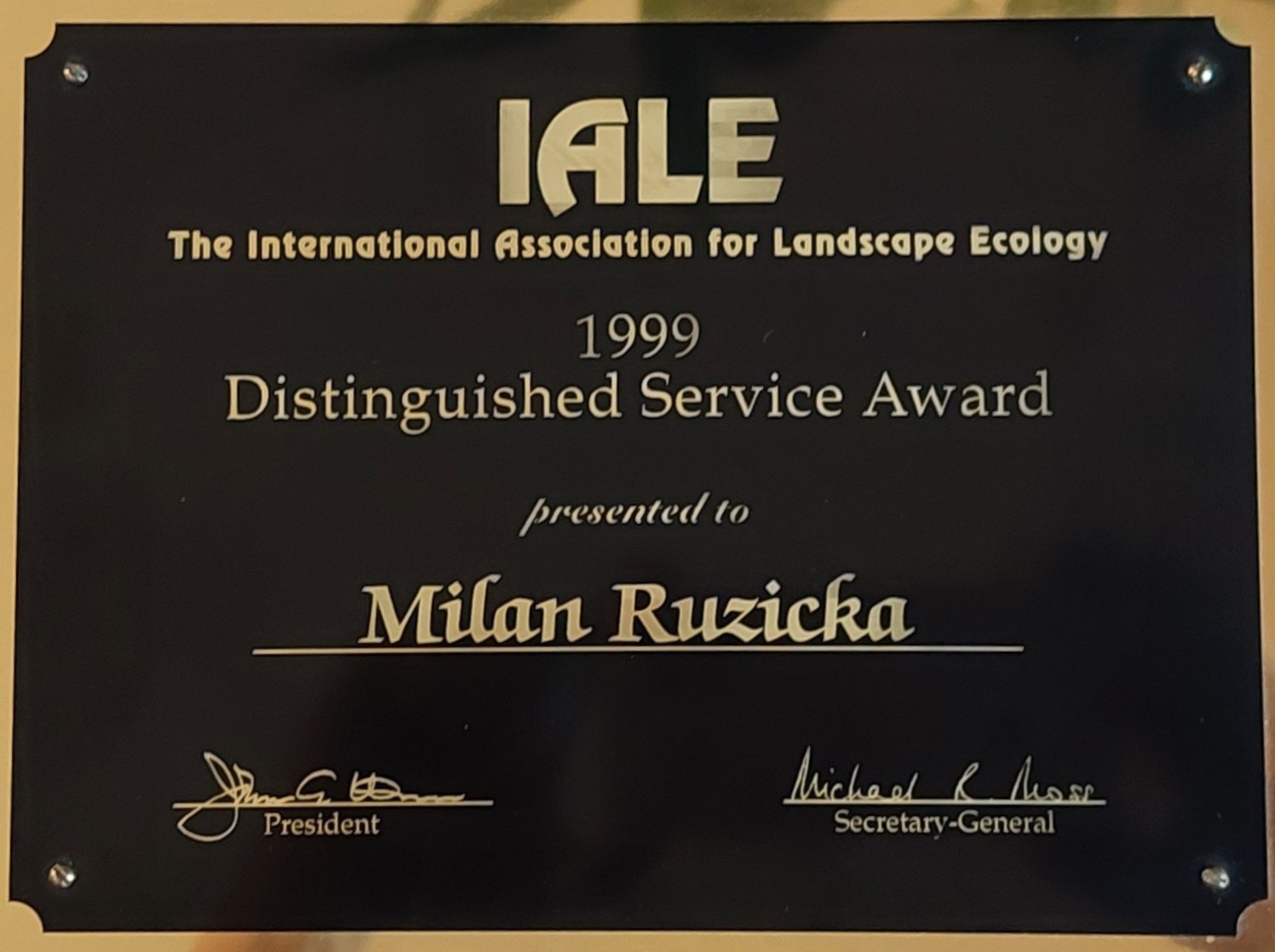About Congress
The IALE 2025 European Landscape Ecology Congress aims to address landscape perspectives in today`s rapidly changing world. It will focus on the role of landscape ecology in reflecting these changes, studying them, and predicting their impacts on both landscapes and society. It will delve into their implications for future landscape development and sustainability. Therefore, we invite researchers and experts from all disciplines related to landscape, students, decision-makers, practitioners and other stakeholders interested from Europe and beyond to explore and discuss these issues together.
To find out more about the importance of Landscape ecology as well as history of the IALE, you can read the following brochure:
About congress history and themes
The Institute of Landscape Ecology of the Slovak Academy of Sciences (ILE SAS) is a research institute devoted to basic and applied landscape ecological research on an interdisciplinary basis, focusing on global environmental challenges, social-ecological systems, new technologies, and applying scientific knowledge in practice.
Established in 1990, ILE SAS evolved from earlier institutes, including the Department of Biology and Landscaping in the Biological Institute, SAS (1961–1964), the Institute of Landscape Biology, SAS (1965–1974) and the Centre of Biological-Ecological Sciences, SAS (1975–1990).

The rose in the IALE 2025 Congress logo honors Prof. Milan Ružička’s contributions to landscape ecology. His surname, “Ružička,” meaning “rose” in Slovak, symbolizes his pioneering work in landscape ecology. In 1965, he founded the Institute of Landscape Biology, one of the first research institutions in the world dedicated to landscape ecology, a discipline that was emerging at the time.
Since 1967, ILE SAS has organized international symposia every three years. During the first symposium, Slovak and Dutch ecologists proposed creating the International Association for Landscape Ecology (IALE), which was further developed at the 1981 “Perspectives in Landscape Ecology” congress in Veldhoven, the Netherlands. IALE was officially founded at the 6th symposium in Piešťany, Slovakia, in 1982. Prof. Ružička, a key initiator, served two terms as IALE Vice President and remained active in international collaborations throughout his career. The Slovak Association for Landscape Ecology (IALE-SK) was founded in 2004.


Themes of the Congress
Theme 1: Understanding ongoing and emergent drivers and pressures of landscape change
Change is inherent to landscapes, either gradual or sudden. Some landscapes are more characterised by continuity and persistence. Yet, what drives these changes and persistence can vary greatly over space and time. In addition to widely recognised drivers like urbanisation, political and demographic changes, climate change, and intensification of agriculture, recent times have witnessed a rise in rapid and unpredictable events that are altering society and reflecting on the landscape. Examples include the COVID-19 pandemic, armed conflicts, the energy crisis and the economic recession. All these drivers operate at various spatial scales, from local to global and from individual to community, exerting direct or indirect pressures on landscapes. Understanding the driving forces and the pressures exerted on landscapes is crucial for managing and planning for landscape changes effectively. Within landscape ecology, these issues can be addressed in several ways, including, for example, investigating emergent drivers and developing new conceptual approaches to studying drivers and pressures.
Theme 2: Monitoring the landscape conditions and impact of landscape change
This theme relates to the role of landscape ecology in addressing the conditions and states that characterise landscapes. Changes in these conditions have been seen to impact landscape patterns and processes, the provision of landscape services, human well-being and the overall quality of the landscapes. Such conditions could be investigated as they have been in the past, as they are now, or as we predict they will unfold in the future. In this regard, approaches such as historical landscape research or the study of landscapes in conjunction with palaeoecological and archaeological investigations provide glimpses of the past, while landscape visions and scenarios help us address the upcoming challenges. Conditions that characterize landscapes can include and are not limited to landscape patterns, processes, and interactions, including biodiversity, habitats and species distribution, human-nature interactions, provision of landscape and ecosystem services.
Theme 3: Responding to changing landscapes
The recent rapidly changing world brought a greater degree of uncertainty in predicting future landscape developments and challenges. The study of the interactions between different elements of the environment and how they respond to different stress factors can provide valuable insights into how landscapes can be managed to better cope with new challenges. Examining the intricate interplay between ecological functions, cultural values, socio-economic factors, and technology allows for better appreciation and protection of our landscapes, ensuring they continue to provide vital services and benefits. For instance, there are increasing efforts in nature and landscape restoration, and approaches such as greening agricultural landscapes, can help steer the future of our landscapes. The theme addresses approaches to improve the efficiency of landscape responses to ongoing challenges, to better plan and manage the response of ecosystems and landscapes to ongoing challenges, as well as the role of policies, planning and emergent governance contexts in promoting sustainable land use practices.
Theme 4: Advancing with new data, tools and methods in landscape ecology
This theme highlights the importance of integrated, data-driven approaches to address the challenges faced by landscapes and societies in a changing world. Advances in landscape ecology research demand and integration of new data, tools, methods, and knowledge sources. For example, many types of Earth observations in different spatial, spectral, and temporal resolutions can be analysed using new digital technologies such as artificial intelligence. Advances in environmental-DNA allow us to study the impact human activities have on landscape processes and even detect endangered species that were otherwise unseen. The rise in big data facilitated a better understanding of human-nature interactions. Newly developed policy and management tools have helped translate scientific findings into practical actions, supporting evidence-based policies that promote environmental sustainability and social well-being. Finally, the integration of artificial intelligence, including machine learning techniques, into landscape ecology research presents itself with both opportunities and challenges. This theme highlights the importance of engagement within the landscape ecology community with forward-looking data, tools and methods to better understand and manage landscapes in the face of rapid environmental change.
About Bratislava

BRATISLAVA/ Pressburg/ Pozsony, also known as the Beauty on the Danube, not only boasts an interesting history but is also the center of one of Central Europe’s most dynamically developing regions. The city, with a population of 425,500, is situated in the southwest of Slovakia, stretching along both banks of the Danube River and in the foothills of the Little Carpathian Mountains. Thanks to this strategic location, Bratislava has always been a commercial hub.
Today, historic landmarks tell the story of the rapid development of the young Slovak Republic. Despite its rich history, Bratislava is one of the youngest capitals in the world, and its population is notably young. The modern metropolis is open to Europe and the world, as evidenced by the growing number of international visitors from diverse countries. They are drawn by the charm of this small yet vibrant city, which blends a lively social scene with historical attractions and contemporary trends. Visitors can enjoy palaces, modern shopping and trade centers, the culinary delights of Slovak chefs and brewers, friendly locals, and a variety of international cultural and sports events, exhibitions, and business opportunities — all of which make Bratislava a city worth visiting.
About history and monuments of Bratislava
HISTORY
Bratislava has long been a strategically important city in Central Europe. December 2, 1291, is not the date of the city’s founding, but rather its “school leaving certificate,” marking the moment its citizens were granted the right to become free citizens of a royal borough. In the 14th and 15th centuries, the city experienced rapid trade development, and the founding of the Academia Istropolitana in 1467 cemented Bratislava’s importance as a cultural and educational center of the Kingdom of Hungary.
After the Ottoman Turks advanced deeper into the Kingdom of Hungary, Bratislava became the capital of the kingdom. It was the seat of the Hungarian Diet, the central administration, and the coronation town of Hungarian Kings and Queens. Between 1563 and 1830, eleven kings and eight royal wives were crowned in Bratislava.
The counter-Turk wars and the Rebellions of Estates in the 16th and 17th centuries interrupted the city’s development, but by the 18th century, particularly under the reign of Queen Maria Theresa, Bratislava’s significance increased again. Many splendid palaces and buildings from this period still stand today.
In the 19th century, the city emerged as a center of cultural life, and it was here that Slovak national emancipation was born. The revolutionary events, the workers’ movement, and the First World War left their mark on the city, but Bratislava ultimately became the political, economic, and cultural heart of Slovaks after 1918.
Today, Bratislava is a modern city and the seat of the country’s most important political, economic, social, and scientific institutions.

MONUMENTS
One of the city’s most prominent landmarks is The Castle of Bratislava, visible from afar. The Old Town, with its charming narrow streets, is the most attractive area of the city, housing the majority of historical sights and cultural institutions. The Old Town’s romantic alleys provide the perfect atmosphere for those wishing to experience history amidst the modern world.
Significant structures in the historic center are part of the Monument Town Reserve, preserving the city’s cultural and architectural heritage.

Contact: iale2025@savba.sk
